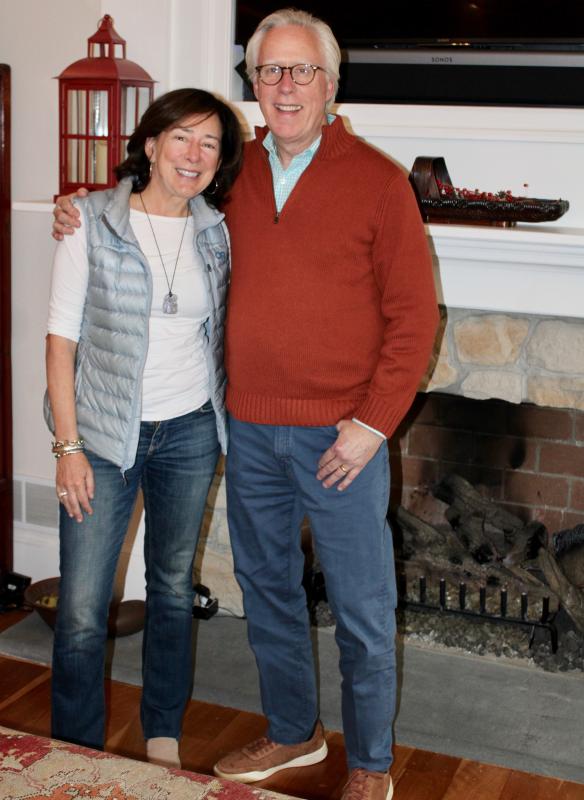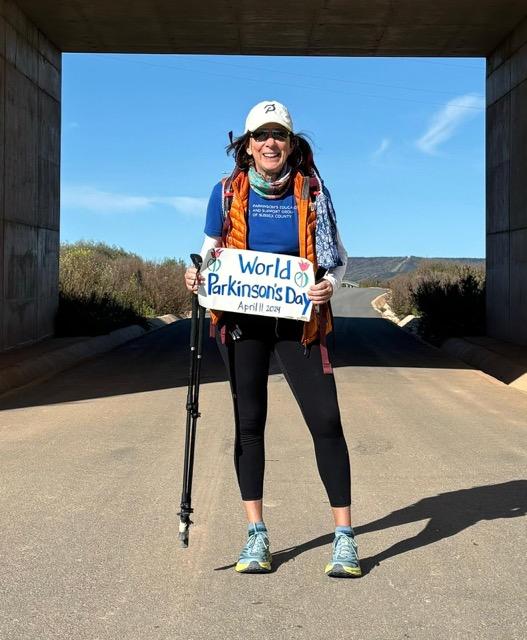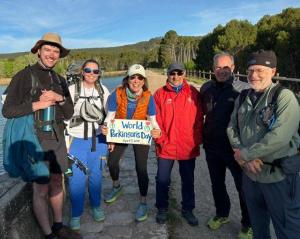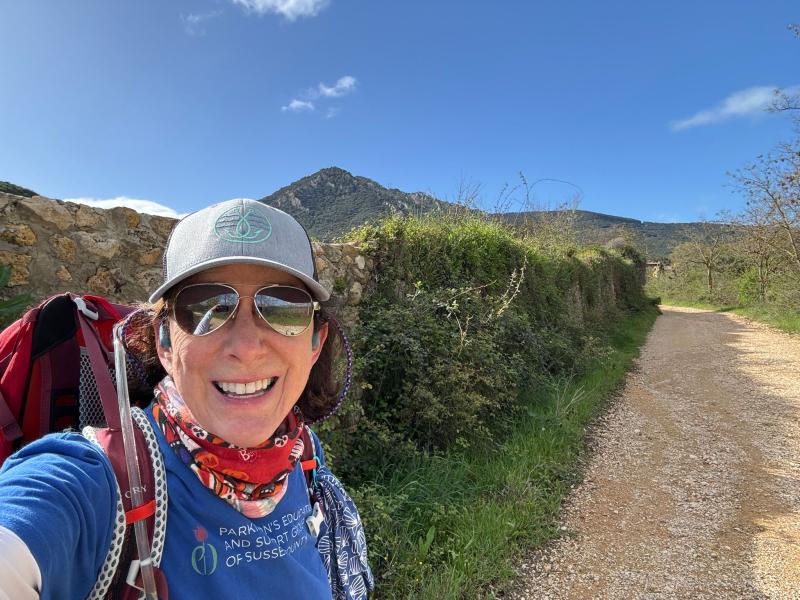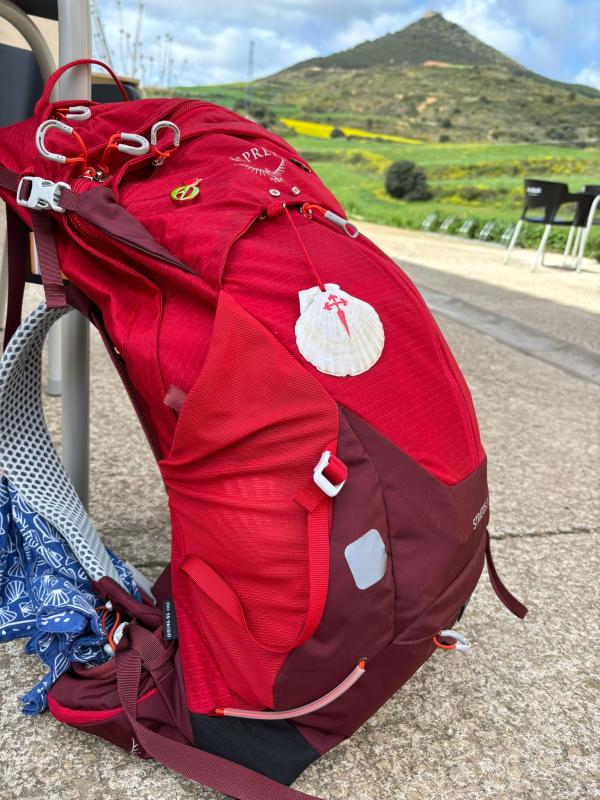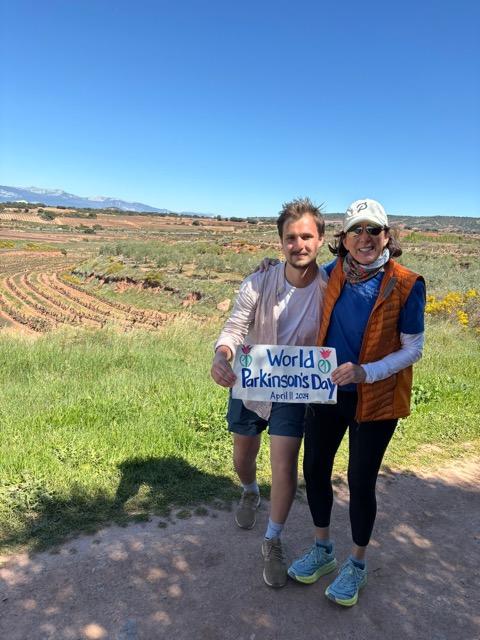Neighbors helping neighbors: A pilgrimage for Parkinson’s
April is Parkinson’s Disease Awareness Month – a time for patients, loved ones and medical professionals to shed light on a devastating disease science has yet to find a cure for. April 11, in particular, is World Parkinson’s Day.
Anita McMullin and Tom McDonald, neighbors in Rehoboth Beach, took time to not only share unfortunate news, but also to form a bond cemented by a journey halfway across the world: A Pilgrimage for Parkinson’s.
“I didn't want to be dealt this hand, but this is the hand I've been dealt,” McDonald said. “There are people who are dealing with things that are much worse than what I'm dealing with. So I'm just going to be as open as I can about it and having the disease.”
McDonald discovered he had Parkinson’s during the pandemic lockdowns.
“My wife and one of my sons said, ‘You realize you have, like, a tremor in your left hand,’ and I was like, ‘Well, yeah, I'm working 14 hours a day and this house is full of all you, like, it's pretty stressful.’ But my wife asked, ‘Would you go see your doctor?’ I went to my doctor, and he sent me to a neurologist. They did some scans, and then they all just said, ‘Good news, you don't have Parkinson's. You don't have dementia. You don't have a brain tumor. But we're gonna watch it for six months.’”
During those six months, McDonald had his hip replaced by the top surgeon in Baltimore. Recovery, expected to last two weeks, went well beyond that window, and McDonald noticed the pain was not subsiding. He asked his doctor if there were any complications during surgery, because he couldn’t walk or put weight on his leg.
“Has anyone ever told you you have Parkinson’s disease?” the doctor asked.
Unfortunately, very little is known about Parkinson’s disease in the medical and scientific community. Research is not only racing to find a cure, but also explore the origins and risk factors for the debilitating disease. Genetics, age and environmental factors are believed to play a part in who may develop the disease, but connections are rarely established. While younger people can have the disease, it’s most common in individuals age 55 and up.
Tremors and decreased mobility or stiffness, as in McDonald’s case, as well as neurological impediment can be indicators someone may have the disease. The disease comes with several other symptoms, including difficulty walking, vision issues, pain, stomach complications and psychological changes. Stiffness is often the main symptom, and it can be eased by the patient’s movement activity.
“Depletion of dopamine is the main cause of the symptoms of rigidity and stiffness, and a bunch of other issues,” McDonald said. “There is enough science to say that movement generates dopamine, and that dopamine flows through your entire body and helps alleviate those problems.”
To that end, McDonald joined the Parkinson’s Education and Support Group of Sussex County, founded in 2009 by Betty and Dennis Leebel, and he quickly became a director of the nearly 200-member group. This group is the one McMullin is raising money for during a 30-day, 500-mile trek on the famous Camino de Santiago across Spain.
“We exercise every day at RISE gym Monday through Friday,” McDonald said. “There's a big Parkinson's community here – over 200 members are part of our group. As you can imagine, when you're talking about that number of people with Parkinson's, they're at all different economic levels. This is the group that we're raising money for. What's so incredible is we that have these great instructors who're trained in a form of exercise therapy called PWR, and that's very specific exercise programs geared toward people with Parkinson's. They have to go through a very extensive training and certification process to get that designation. But any member from our community that joins RISE gym, we pay for a membership.”
McMullin took up the cause when she learned about McDonald’s diagnosis.
“I was struck by how he took this diagnosis and was comfortable sharing with a neighbor,” McMullin said. “I felt let in, which was really nice, and there's a comfort there.”
“Then I thought, what can I do to help after learning his story, especially, and what does support look like?” McMullin said.
Inspired not only by his sharing but also his commitment to PESGSC, McMullin made plans and set out on her journey April 3 in the Pyrenees Mountains of France on the doorstep of Spain. Since the Camino de Santiago is a religious pilgrimage for some Christians, Anita and Tom billed the adventure as a Pilgrimage for Parkinson’s and started a fundraiser with a goal of $50,000 to benefit PESGSC.
At a pace of 15 miles per day, McMullin had successfully walked more than 100 miles as of April 10. The fundraising campaign, however, exceeded its goal of $50,000 April 9.
“We couldn't be more thrilled with the way the broader community has embraced this campaign,” McDonald said. “We've had gifts ranging from $20 to $5,000. We've had families and friends step up, and we've had neighbors come together. We've had perfect strangers donate to us.”
Although the goal has been reached, Anita and Tom are now hoping to raise as much money as possible for PESGSC. Patients diagnosed with the disease are helped by the gym memberships, but there are also a lot of medical bills associated with proper care.
“Things like physical therapy, speech therapy, occupational therapy, and then as the disease progresses, there are all sorts of other expenses that people confront,” McDonald explained. “Families have to make choices about whether the patient can be cared for at home.”
There is hope, however, for Parkinson’s patients and their families.
“I'm in a research study at Johns Hopkins where one of the principal investigators said to me, ‘You know, Tom, you're going to die, but you're not going to die from Parkinson's – because what's happening right now with the advent of AI and quantum computing, we are making advances that I've never seen in my 22 years of doing research, and there are going to be new therapies brought to the market in the relatively near term that I never would have imagined we would have been able to develop.’”
As science and the medical field continue to research the origins of Parkinson’s disease and look for a cure, patients like those in PESGSC are trying their best to use movement and exercise to alleviate their symptoms.
“It's not lost on me that this, you know, 500 miles in 30 days or so, is a journey I'm very, very fortunate to be able to take and I feel pretty lucky,” McMullin said. “I know others can't face those kinds of physical limitations of walking 15 miles a day, every day, for a 30-day journey. My 30-day journey is very different than a lifetime journey for folks who are dealing with Parkinson's.”
Every dollar raised will go straight to PESGSC, which is important to McDonald and McMullin because they want to keep the money and resources local to help their neighbors in need. McMullin is footing the bill for the journey herself.
One of the complicated issues of Parkinson’s is the effectiveness of medications used for the disease. McDonald was told he has less than 10 years of positive interaction with his prescription. However, he believes there are behavioral and dieting changes someone diagnosed with the disease can make.
“The sooner you start the medication, the sooner you start the exercise, and as soon as you change your diet away from fatty foods and things that are bad for you, the better outcomes you have,” McDonald said.
McDonald said it is important to have honest conversations with medical professionals to advocate for proper care. Loved ones, suspecting they may know someone with the disease, should try to have those hard conversations and utilize the local support group.
“The Parkinson's group here I think can be a great resource, that website or any member of our community would gladly talk to somebody that reached out to us and said, ‘Hey, I'm worried about my dad, you know, could you talk to them about potentially seeing a doctor?’” McDonald said.
More information about the disease and PESGSC is available at sussexcountyparkinsons.com.
Donations to the Pilgrimage for Parkinson’s fundraiser can be made at donorbox.org/pilgrimage-for-parkinson-s-walking-el-camino-for-a-cure-1. Visitors to the site can also track McMullin’s progress on her journey, as she will post pictures and McDonald will provide updates on her progress. Doing his part for the cause, Tom is tracking his exercise and in the first week managed nearly 10 hours of boxing, spinning, PWR and suspension training.
A Parkinson’s expo at the Rehoboth Beach Convention Center with over 30 vendors will be held Saturday, May 4.

